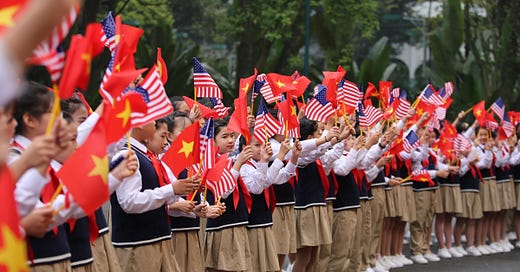
By: David Brown
Ambassador Marc Knapper and several other embassy officers I spoke to nearly a year ago expressed confidence that US-Vietnam relations were going to grow substantially closer. I found that claim hard to credit, given that any elevation of Vietnam’s ties with the US was certain to piss off Beijing. Vietnamese friends typically noted, if the subject came up, that America was a fickle partner, prone to mood swings. It might or might not keep its promises. Indeed, former President Donald Trump had disavowed the arduously negotiated Trans-Pacific Partnership – leaving Vietnam and nine other signatories in the lurch – and President Joe Biden, sensing organized labor’s antipathy to the pact, had let it lie.
Meanwhile, those same Vietnamese friends would inevitably note, China was eternally there, a hulking presence on Vietnam’s northern border, and, to a worrisome degree, along Vietnam’s long coast and in adjacent Laos and Cambodia. If Beijing perceived Hanoi to be drifting out of its orbit, it had the means – economic and military – to squeeze Vietnam. And, they asked, would Washington rise to such a challenge?
Perhaps we shall find out. The worst-kept secret in Washington is that today, September 10, Joe Biden and Vietnam’s top leaders will announce an agreement to establish a comprehensive strategic partnership, symbolically equivalent to Vietnam’s relations with China and Russia.
I would have bet against General Secretary Nguyễn Phú Trọng’s agreeing to such a radical step. As head of the Vietnamese Communist Party, he’s the primary interlocutor with Xi Jinping. And, as first among equals in the Hanoi power structure, he’s the person who orchestrated the dismissal only nine months ago of leaders considered to be partial to the US: Nguyễn Xuân Phúc, then Vietnam’s president, and Deputy Prime Minister Phạm Bình Minh.
In general, and particularly since 2016, when Trọng crushed a challenge by the incumbent prime minister, Vietnam’s foreign policy approach has been carefully calibrated to avoid angering Beijing. With China unswervingly intent on enforcing baseless sovereignty claims over the South China Sea, extending its influence in Laos and Cambodia, and descending into economic recession, what the Biden Administration has to offer Vietnam may have sounded better and better to Hanoi’s leaders – especially at a time when an utterly tone-deaf Beijing, just days before the Group of 20 meeting in New Delhi, managed to alienate the entire region by publishing a revised “10-dash map” expanding its claims not only to bigger areas of the South China Sea but to the waters around the Indian state of Arunachal Pradesh and the Aksai Chin plateau.
As Professor Jonathan London blogged on September 8, “in both economy and security, the strategic interests of the United States and Vietnam are extremely closely aligned. Economic restructuring in Vietnam will require swift upgrades in the capabilities of its domestic producers and effective, long-term investments in its economy and people, perhaps especially from the US. In defending its territorial integrity, Vietnam will benefit from America’s unique defense capabilities.”
In negotiating the CSP, the US seems to perceive Vietnam much the way it saw China a generation or so ago – a source of junior partners for US firms in a mutually profitable high-tech production relationship. The White House announcement of Biden’s pending visit refers to “promot(ing) the growth of a technology-focused and innovation-driven Vietnamese economy (and) expand(ing) . . . workforce development programs.” If Hanoi manages things properly, it will be increasingly favored as a destination for US private investment and will reap, in particular, rapid upskilling of its labor force.
With the US-Vietnam CSP in place, together with similar pacts recently concluded with Australia and Singapore, no one should be surprised to see rapid expansion of security cooperation. The chief aim of the Quadrilateral Security Dialogue, the increasingly tangible treaty arrangement between Australia, India, Japan, and the United States, is the security of sea lanes; Hanoi is thwarting China’s bogus claim to the energy and marine resources off Vietnam’s shores. These objectives are mutually reinforcing. No longer able to depend on Russia for advanced weapons systems, Vietnam will be looking to its new partners for procurement assistance at promotional prices. In return, it can offer access to excellent harbors along a long coastline.
Strategically, in advertising its resolve to expand its ties with the United States and like-minded states, Hanoi is taking a carefully calculated risk. China won’t acquiesce meekly to Vietnam’s abandonment of balancing between Beijing and Washington. It may take Beijing quite a while, and perhaps new leadership, before it realizes that it is its tone-deaf efforts to enforce its will in regional waters that has driven even Vietnam into de facto alliance with other advocates of a free and independent Indo-Pacific.
David Brown is a former US diplomat with extensive experience in Southeast Asia. He is a regular contributor to Asia Sentinel








Reminds me of this quote. "We hated them as occupiers. But we welcomed them as friends."
One really has to wonder at the amazing ability of China to piss off and scare its neighbouring countries enough that even one with such a painful history with the US such as Vietnam would rather link up with them instead of just give in and fall into China's orbit.